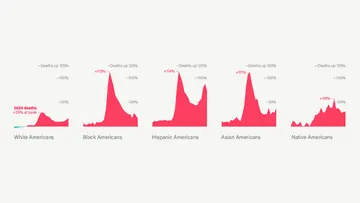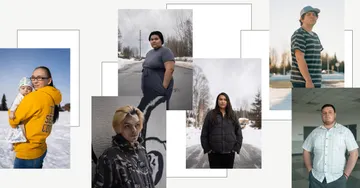In an already contentious national debate over immigration, news of migrant children separated from their parents have raised questions for many about what's happening. Marshall Project contributing writer Julia Preston, who has covered immigration issues in Washington and on the border for years, offers some answers.
Are the recent separations of at least 2,000 children from their parents at the Mexican border the result of a Trump administration policy?
Yes.
On May 7, Attorney General Jeff Sessions announced “important new enforcement policies” of “zero tolerance” at the border. The Department of Homeland Security, or DHS, which is in charge of border enforcement, began to refer any immigrant caught crossing without legal documents to the Department of Justice, to be prosecuted for a crime in federal court. As part of the new policy, parents who were criminally prosecuted were separated from their children.
“We are here to send a message to the world: we are not going to let this country be overwhelmed,” Sessions said, explaining the new approach. “If you cross this border unlawfully, then we will prosecute you. It’s that simple.”
So, illegal border crossers were not prosecuted previously?
Before the zero tolerance policy, most immigrants caught at the border were prosecuted for immigration violations in proceedings in immigration court, not in federal criminal court. Some were quickly deported. But many of the migrants coming from Central America (the majority of those apprehended in recent months) told border authorities they were afraid to return to their home countries and asked for asylum protection the United States. Most asylum-seekers were detained for some period. Many were released, to travel to places where their asylum claims would be heard in immigration courts around the country.
Since at least the administration of President George W. Bush, federal officials have used prosecution in federal criminal court as an extra punishment and deterrent for illegal border crossers, but only in limited regions of the border. It was one of several “consequences” DHS border authorities applied strategically, depending on the migrant flow at different border points. This is the first time federal criminal prosecution has been applied for all illegal border crossings.
Is it in fact a crime to cross the border illegally?
Yes.
Entry without inspection by an immigration officer is a federal misdemeanor on the first offense, punishable by up to six months in prison. On the second offense it is a felony, with up to 2 years in prison. Returning to the United States illegally after deportation is also a felony.
Okay. So doesn’t the law require children to be separated from parents caught crossing illegally?
No, it doesn’t.
The surge in children separated from parents since May 7 is directly related to the Trump administration’s zero tolerance policy. This is convoluted, so bear with me.
Under that policy, parents apprehended at the border have been transferred from Customs and Border Protection, an agency that includes the Border Patrol and is part of DHS, into the custody of the United States Marshals Service. Those are the law enforcement officers who handle movements of people on trial in federal courts. The parents have been held in federal pre-trial detention.
Their children don’t go with them. When the parents and their children crossed the border, they were together, forming what DHS officials call a family unit. Under the new policy, when the parent is transferred to federal court, DHS officials are re-classifying their children as unaccompanied minors—the term for children who arrived at a United States border without a parent or legal guardian. The children are physically separated from their parents. They are sent to deportation proceedings in immigration court, separate from their parents. And, by law, DHS border officials are required within 72 hours to transfer the children to the custody of yet another federal agency: the Department of Health and Human Services, or HHS. The children are held in shelters overseen by health officials, mostly administered by private contractors, which are closed to the public.
Can DHS officials just declare that a child who crossed the border with a parent now suddenly is unaccompanied, and separate them to be sent to HHS shelters?
Good question.
DHS officials say they have broad authority to make these determinations. But until the zero tolerance policy, DHS officials were identifying children as unaccompanied only if there was no parent or legal guardian with them “at the time of apprehension.”
The explicit intent of several laws and federal court rulings governing the handling of children at the border is that they should always be treated with special care. In general under American law, disrupting or severing the relationship between a child and their parent is a severe measure to be taken when less harsh alternatives are not available.
Well, are there alternatives? Didn’t the Obama administration separate families, too?
There are alternatives.
Before the zero tolerance policy of sending migrants to criminal court, parents and children who were in immigration proceedings were generally held together in detention centers specially equipped for families. There are two big centers in Texas and one in Berks County, Pennsylvania.
The Obama administration detained families, sometimes holding young children and their parents for long periods. However, after a ruling by a federal court in California in 2015, the families could not be held in those centers for longer than about three weeks, and they had to be released to fight their court cases free of detention. Under President Obama, separation of children from parents was rare, mostly limited to relatively few cases where parents were suspected of serious trafficking and other crimes.
Doesn’t the administration have to separate the families because of the Flores agreement? What is the Flores agreement anyway?
No, the Flores agreement does not require family separation.
The Flores agreement was a court settlement first reached in 1997, requiring immigration authorities to release children from immigration detention without unnecessary delay to parents or relatives. It was revised by the California court ruling in 2015, which required authorities to prioritize family reunification--not separation--and to release children and their parents as fast as possible and generally in no more than about three weeks.
Secretary of Homeland Security Kirstjen Nielsen said that family separation “is not a controversial idea” because the same thing would happen to an American accused of a crime. So is this so different?
Yes.
When people are arrested on federal charges, the police do not immediately, arbitrarily seize and detain their children and turn custody over to a federal agency.
So when do the parents get their children back?
In principle, when they finish in federal court. In practice, unclear.
Up to now, most of the parents are going through super-fast-track mass trials in federal courts, where they are pleading guilty to a misdemeanor and being sentenced to time served, often in as little as 48 hours for the whole trial. According to public defenders representing them in court, the parents are often frantic and desperate to be reunited with their children, and they agree to guilty pleas without fully understanding the consequences. After trial, the parents are sent back to DHS to be detained for immigration proceedings. As convicted criminals, they will almost certainly be deported.
Health Department officials, with hundreds of minors coming into their custody in just a few weeks, have not yet established clear procedures to reunite children with parents after trial. Parents are having great difficulty finding out where their children are or communicating with them.
Didn’t a lot of these parents want to apply for asylum?
Yes.
Most of the families are running from three countries in Central America that have been overrun by vicious street gangs and other criminal organizations. Many say they fled when gangs tried to recruit their teenage boys or threatened sexual assault against their daughters. Women have faced an epidemic of sexual violence.
So did they file their asylum claims?
No.
Under zero tolerance, Sessions and Nielsen have declared that anyone crossing without documents between border stations (in DHS-speak, “ports of entry”) will be subject to criminal prosecution for illegal entry. They are no longer allowing migrants to ask for asylum from Border Patrol agents in the field. Most of the asylum-seekers in the migrant wave since 2014 forded the Rio Grande river in Texas or crossed illegally through some other border region and turned themselves in to Border Patrol agents to ask for protection.
Nielsen said migrants seeking asylum should come to a border station to ask for protection, and if they did they would not be separated from their children.
It’s unclear what legal authority underpins this new distinction, and so far in practice border authorities have not applied it consistently. The American Civil Liberties Union brought a lawsuit earlier this year on behalf of a Congolese migrant who came to a border station and was separated from her child anyway.
Why is the Trump administration insisting on separating children from their parents?
It depends on which official is speaking.
Steven Wagner, the Acting Assistant Secretary in charge of children and families at the Department of Health and Human Services, who oversees the shelter system, explained one goal in a telephonic media briefing on Tuesday.
“We expect the new policy will result in a deterrence effect,” Wagner said. “We certainly hope that parents stop bringing kids on this dangerous journey and entering the country illegally.”

